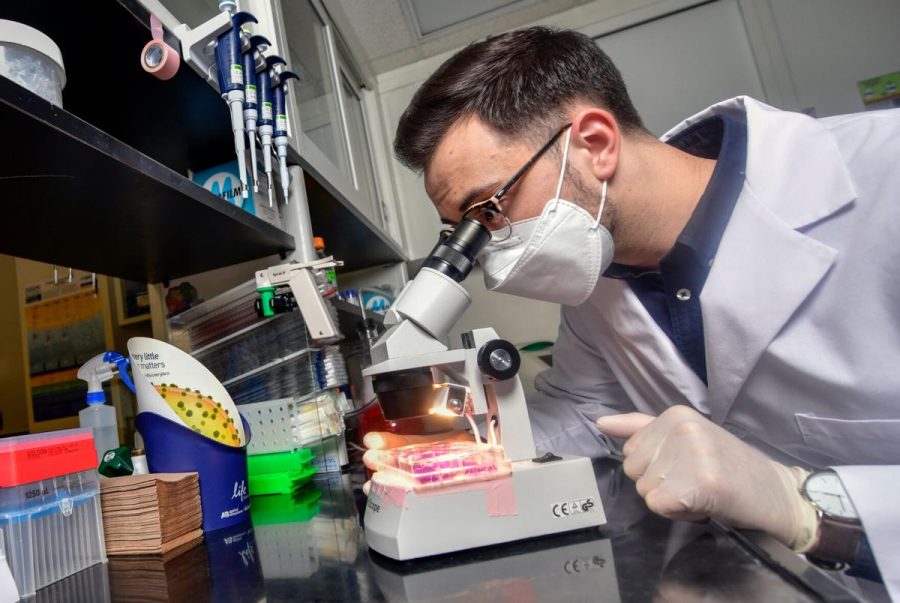How Much of a Threat Do Covid-19 Variants Pose?
Scientists are have identified three main variants, and are currently working to understand how they behave differently from the original Covid-19 virus.
February 22, 2021
Despite the recent dip in daily Covid-19 cases, a new threat looms large on the horizon: several variants of SARS-CoV-2, the virus behind the pandemic, have been discovered in the US and around the world. Unless steps are taken to contain their spread, these variants could fuel the next wave of case growth, ultimately leading to more infections, hospitalizations, and deaths.
The CDC has identified three different variations in global circulation: a variant from the UK (B.1.1.7), one from South Africa (B.1.351), and one from Brazil (P.1). Additionally, a new variant has emerged in California, called CAL.20C. The B.1.525 variant was first detected in the UK and Nigeria, and has now been documented in 11 countries, including America. Finally, a variant called B.1.2 has spread widely in the American South and Southwest.
According to the CDC, all viruses change and mutate constantly, and new variants are always expected to appear over time. Sometimes, variants develop and disappear; other times, the variants persist. Since the beginning of the pandemic, scientists have been monitoring changes in the SARS-CoV-2 virus, specifically by watching changes to the spikes on the surface of the virus and conducting genetic analyses. Through these studies, scientists are beginning to understand how different mutations spread and what happens to people infected with them.
For instance, a British study found that the UK variant may be up to 70% deadlier than the original virus. Numerous studies also suggest that this variant is 70% more contagious than the first Covid-19 virus, and that is corroborated by the fact that B.1.1.7 has already spread to more than 50 countries and 44 US states. Top scientists have expressed fear that this strain is “going to sweep the world.” Fortunately, the vaccines are currently effective against this variant, but fears abound that B.1.1.7 will continue to evolve and become inoculation-resistant.
The same cannot be said of the B.1.351 variant, which originated in and has spread widely throughout South Africa. There, clinical trials revealed that patients who had received the AstraZeneca vaccine were not protected against mild or moderate illness caused by the variant. South Africa halted use of the vaccine in response to this evidence, only a week after a million new doses arrived in the country.
Cases of this Covid-19 strain have been documented in 40 countries, including the US, and Dr. Anthony Fauci warned on Sunday that “if it becomes more dominant, we may need a version of the vaccine that’s effective specifically against” it. The FDA is preparing a plan to do such, but it is unclear how long it could take to develop a vaccine against B.1.525 if cases surge in America.
In addition to the UK and South Africa variants, experts are also focusing on the P.1 variant from Brazil. Like the other two, the Brazilian strain has the E484K mutation, which may help it evade antibodies. All three variants have also undergone changes to their spike protein, the part of the virus which attaches to human cells, which allows them to infect and spread more easily. P.1 has spread to 20 countries, but though it shares many mutations with the highly contagious British and South African variants, there is no evidence suggesting that this Brazilian strain spreads more quickly or causes more severe infection.
Ultimately, it is not a surprise that several Covid-19 variants have emerged; all viruses mutate as they make copies of themselves and spread. In fact, it’s likely that new variants will continue to emerge. Just like with any virus, most of the mutations to SARS-Cov-2 are inconsequential, but scientists around the world continue to monitor the changes and take action against more significant variants, like P.1, B.1.525, and B.1.1.7.
Expected or otherwise, it is still critical to take these variants seriously and work to confine their spread. Increasing awareness is key; according to junior Alex Denning, many, including herself, “haven’t heard anything about the variants.” Others have unanswered questions, like junior Ella Niehoff who says it is “interesting that the Covid-19 vaccine is supposed to be at least 90% effective, yet there are new variants appearing. The variants make me doubt the vaccines’ effectiveness.”
It is also important to continue wearing masks, social distancing, restricting travel, and taking any other necessary precautions. As Fauci cautioned on Sunday, even though case numbers have been declining and some experts are predicting that herd immunity is just around the corner, it is a mistake to think that “we’re out of the woods now.” Just today, the pandemic death toll hit 500,000, offering a somber reminder that although great progress has been made, Covid-19 continues to claim lives every day.
At this point, it is impossible to say whether the three major variants will significantly alter the trajectory of the pandemic; some experts have predicted that they will cause a surge in cases, while others expect the decline in cases to continue uninterrupted. Scientists around the world continue to monitor the situation closely, researching how the variants infect people, how they spread, how they respond to vaccination, and more. Likewise, Americans should continue to take the pandemic seriously and abide by all social distancing guidelines, as this is the best way to contain the spread of the original Covid-19 virus and its variants.


































